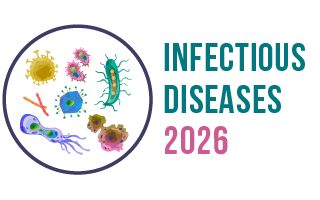4th International Conference on
Infectious Diseases
September 09-10, 2026 | Barcelona, Spain

Address: Avinguda Del Maresme 78 Ronda De Dalt Exit 15, 08940 Comella de Llobregat, Barcelona, Spain
Infectious Diseases 2026

Dokuz Eylul University, Turkey
Abstract:
Coronaviruses are a large family of viruses that, according to evidence, can cause diseases ranging from the common cold to more severe diseases such as Middle East Respiratory Syndrome (MERS) or even more severe diseases such as Severe Acute Respiratory Syndrome (SARS). Epidemiology A disease, whether contagious or non-contagious, may be more or less common in some areas and under some conditions among a large number of people. In other words, a disease can be more or less common. The science that studies how diseases spread and what causes them to spread is called epidemiology, which is a branch of medical science. Basically, epidemiology seeks to prevent the occurrence and spread of a disease or to control it if it does spread. Communicable diseases are a type of infectious disease that can be transmitted from person to person or to humans through insects and other animals. This disease can also be transmitted by organisms in contaminated water or food that has been exposed to the environment by an infected person. For example, a sick child's cough is one way to transmit a cold or flu to others, which must be well taken care of and prevented. In general, the factors that because infectious diseases include viruses, bacteria, and parasites. The signs and symptoms of infectious diseases will also vary depending on the agent causing the infection.
Biography:
Delia Teresa Sponza is a faculty member at Dokuz Eylul University in the Department of Environmental Engineering. Her research focuses on environmental microbiology, wastewater treatment technologies (including anaerobic/aerobic systems), industrial toxicity, nutrient removal, and the effects of heavy metals and toxic compounds on microorganisms. She has extensively studied the treatment of complex industrial wastewaters using innovative methods such as sonication, nanoparticles, and biosurfactants. Sponza has authored numerous international publications, with an H-index of 42 and over 6,000 citations.
